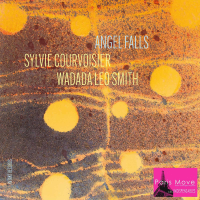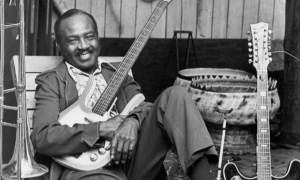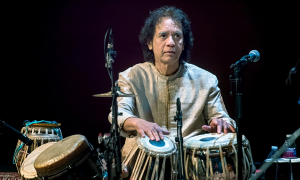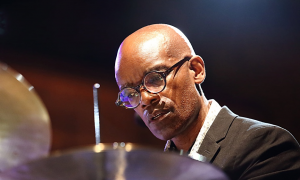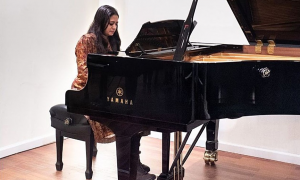Home » Jazz Articles » Under the Radar » State and Mainstream: The Jazz Ambassadors and the U.S. ...
State and Mainstream: The Jazz Ambassadors and the U.S. State Department
O'Leary's first experiences with the Jazz Ambassador Program were extensive. He recalls that "In 2001, I conducted workshops and performed in Equatorial Guinea, Cameroon, Chad, Niger, Ivory Coast, Ghana, Nigeria, Burkina Faso, Benin, Guinea and Senegal with Scott Robinson and Larry Ham. We were out for nearly two months. In the spring of 2002, Larry Ham, saxophonist Dave Glasser and percussionist Leroy Williams toured the Ivory Coast and Burkina Faso for two weeks. In October, 2002, I conducted workshops and performed in Indonesia, Malaysia, Vietnam and Sri Lanka with pianist/vocalist Bill Heid and drummer Mike Petrosino. We were out for one month. I was back in NYC for three days and then headed to Argentina, Uruguay, Paraguay, Chile, Ecuador, Colombia and Trinidad with Bob Dorough and guitarist Steve Berger. We were also out for one month. In 2003, on the strength of our previous tour, Bill Heid, Mike Petrosino and I headed back to Southeast Asia for a two month tour of Indonesia, Bali, Malaysia, Singapore and Sri Lanka. In 2004, I was asked to teach bass, piano and composition at the Musik Institute Daya in Indonesia. This was a State Department sponsored tour under the American Cultural Specialist program. In 2005, I conducted workshops and performed in South Africa, Malawi, Mozambique, Mauritius and Comoros with Bill Heid, Mike Petrosino and pianist/vocalist Jay Klum. We were out for one month."
In 2015, O'Leary joined with Stravelli for their Eastern Europe and Western Asia tour. His overall experiences with the Jazz Ambassador Program were rewarding: "Everything was above board, at all times. Our briefings both in Washington and at every embassy post were thorough and informative. We found most embassy personnel to be very congenial and willing to fulfill any of our requests. For example—"can you work it out so that we can invite these 40 kids to join us in our concert at the National Theatre of Ghana tomorrow evening?" and "can you pay them something for their time?" The Public Affairs officer, Robert Arbuckle made that happen. Or, "can you please invite a gamelan group to join our trio at our concert in Bali?" The Public Affairs officer in Bali made that happen. For the first couple of years, the Jazz Ambassador program had a specific theme that they wanted us to adhere to. We (Scott Robinson, Larry Ham and myself) were asked to perform the music of Louis Armstrong when we toured Africa in 2001. In 2002 the theme was The Blues. I toured with two groups that year. The Bill Heid Trio (Pat O'Leary and Mike Petrosino) toured Southeast Asia and the Bob Dorough Trio (Steve Berger and Pat O'Leary) toured South America."
Given the extensiveness of O'Leary's travels, it's not surprising that there were a few snags along the way: "We were taking a two embassy vehicle caravan from Lagos to Port Harcourt, Nigeria. At a traffic circle, a local slammed into the side of the front embassy vehicle. Within minutes the vehicle was surrounded by dozens of people. They tried pushing and shoving the vehicle in hopes the passengers would leave the vehicle to...rob them, perhaps? The embassy drivers were instructed to never open the windows or doors under such circumstances. The driver slowly drove through the crowd. We found out later that such occurrences are common because the locals feel that they can "shake down" the embassy personnel and passengers. We had to cut our trip to Chad early because the embassy personnel felt that the election that was taking place would lead to some problems. The lobby of our Indonesian Hotel was bombed the day after we left. Twenty people lost their lives. Some of our concerts and workshops were cancelled in Pakistan due to the many protests that occurred after the current administration's allegations of Pakistan's harboring of terrorists."
Those musicians who have participated in the Jazz Ambassador Program have the first-hand experience of seeing and hearing the impact that music can make in bringing people together and crossing cultural divides. For that reason, they—and the Bureau of Educational and Cultural Affairs at the State Department—are the most concerned that funding for the program does not continue to evaporate. As O'Leary puts it: "I hope that the current administration understands the importance of these programs. If not, the money needed to continue these tours will be cut drastically in the next couple of years. We're just doing our best to achieve peace through music."
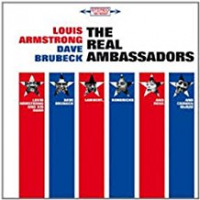 Louis Armstrong/Dave Brubeck/Lambert, Hendricks and Ross/Carmen McRae: The Real Ambassadors (Columbia Masterworks, 1962)
Louis Armstrong/Dave Brubeck/Lambert, Hendricks and Ross/Carmen McRae: The Real Ambassadors (Columbia Masterworks, 1962) The original narration to The Real Ambassadors sets up the premise behind this recording -a backstory that is missing from the audio translation. In the words, as written by Iola Brubeck, she summarizes the story of a jazz shaman who broke down cultural and political barriers through his music, while facing a personal struggle for his civil rights. The narration, in part, reads: "The personal history of our hero reads like the story of jazz—up from Lake Ponchartrain to Chicago and beyond—from New York City to San Francisco, London to Tokyo and points in between. The music which poured from his horn became his identity—his passport to the world—the key to locked doors. Through it he had opened doors to presidents and kings. He had lifted up his horn, as our hero would say, and just played to folks on an even soul-to-soul basis. He had no political message, no slogan, no plan to sell or save the world. Yet he, and the other traveling musicians like him had inadvertently served a national purpose, which officials recognized and eventually sanctioned with a program called cultural exchange." The mythical horn player was based on a barely-veiled form of Louis Armstrong.
The original vinyl version of The Real Ambassadors contained only half of the material from the play as Armstrong's availability for recording sessions was limited. Because Armstrong was central to the plot and was the living representation of the music and disposition of the play's character, the Brubecks' never considered an alternative. Carmen McRae's complexity and intelligence made her the authors' choice of a perfect complement to Armstrong and Lambert, Hendricks and Ross were naturals as either a Greek chorus or a light interlude.
How well The Real Ambassadors has aged is a valid question; a few numbers feel quite banal after five decades, and the high-pitched vocalese (of which there is much) can be grating. Armstrong does more singing than playing and though his vocal skills led to a highly successful rebirth of his career, it may not be the Armstrong that jazz fans want to hear. That said, there is unquestionable power and emotion when he sings the words They say I look like God! Could God be black?. Still, The Real Ambassadors is an important historical record and the only one of its kind. It's a vision of Dave and Iola Brubeck that has gone largely unrecognized.
The Brubeck Brothers Quartet has released Timeline (Blue Forest Records, 2018) to commemorate the sixtieth anniversary of Dave Brubeck's 1958 State Department tour. It contains seven of the late pianist's compositions among eleven tracks.
Thanks to all who kindly agreed to be interviewed for this article: Zé Maurício, Gabrielle Stravelli, Pat O'Leary and especially the State Department's Elaine Clayton who facilitated those connections.
Tags
Under the Radar
Karl Ackermann
Sidney Bechet
Benny Carter
duke ellington
Louis Armstrong
Dizzy Gillespie
Charlie Christian
Charlie Parker
Max Roach
Thelonious Monk
Milt Hinton
Cab Calloway
Miles Davis
Benny Goodman
Teddy Wilson
Coleman Hawkins
Billie Holiday
Dave Brubeck
Paul Desmond
Carmen McRae
archie shepp
Ornette Coleman
Charles Mingus
Paquito D'Rivera
wynton marsalis
Nana Vasconcelos
Joanne Brakeen
eddie gomez
Slide Hampton
Hugh Brodie
Lester Young
Sonny Stitt
Johnny Griffin
Albert Ayler
Mel Lewis
Bucky Pizzarelli
Jerry Bergozi
Diana Krall
James Moody
Lee Konitz
joe lovano
Lionel Hampton
Illinois Jacquet
PREVIOUS / NEXT
Support All About Jazz
 All About Jazz has been a pillar of jazz since 1995, championing it as an art form and, more importantly, supporting the musicians who make it. Our enduring commitment has made "AAJ" one of the most culturally important websites of its kind, read by hundreds of thousands of fans, musicians and industry figures every month.
All About Jazz has been a pillar of jazz since 1995, championing it as an art form and, more importantly, supporting the musicians who make it. Our enduring commitment has made "AAJ" one of the most culturally important websites of its kind, read by hundreds of thousands of fans, musicians and industry figures every month.









